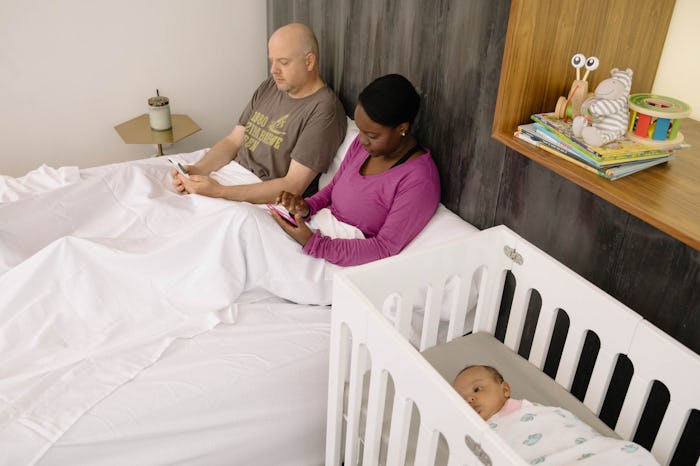One of the best decisions I made with my children was allowing them to co-sleep. My intentions were purely selfish; I knew that waking up in the middle of the night and walking across the hall to another room to calm or feed my babies would completely ruin my sleep. So I put their crib adjacent to my bed, and was able to feed them and calm them without even getting out of bed. I was at peace and so were the kids, and they often slept through the night. But does co-sleeping make your baby sleep longer? Trying to put your baby to bed and hoping they'll sleep through the night can be really difficult for parents. Is co-sleeping the solution?
What is co-sleeping anyway? Co-sleeping, also called room-sharing, is defined as a baby sleeping close to the parents' bed on a separate firm surface, says Christine Stevens, a Certified Sleep Coach and author of 7 Tips to Help Your Child Get the Sleep They Need. Unlike co-sleeping, she tells Romper that bed-sharing (where the baby sleeps in your bed) is not safe, according to the American Academy of Pediatrics (AAP), and remains the greatest risk factor for sleep-related infant deaths.
So will babies sleep longer if they co-sleep? A sleep study, A Comparison of the Sleep–Wake Patterns of Co-sleeping and Solitary-Sleeping Infants, found that babies through the age of 15 months who co-sleep wake up more often through the night, but stayed awake for shorter durations of time as compared to babies that slept alone. So while co-sleeping may mean your baby wakes more frequently, it also means they will fall asleep sooner, and stay in a drowsy sleepy state versus being wide awake.
For younger babies, long periods of deep sleep is not a good thing. Sleep researchers, explained the website for Dr. Sears, have found that lighter sleep is more appropriate for young babies because it helps their brains develop more than any deep sleep would. Their studies also found that babies don't sleep as deeply as adults, and they wake more frequently through the night because in order to survive through hunger, or the risk of Sudden Infant Death Syndrome (SIDS), they need to be able to wake up and communicate their anguish. The good news is, noted the Ask Dr. Sears website, that starting around 4 months, your baby's sleep patterns will change and start becoming more adult-like, and they will sleep for longer stretches.
In my experience, co-sleeping gave me and my children a mutual awareness of each other, and while co-sleeping may not help babies sleep longer, it may make them sleep more comfortably. If, in the process, you catch more Zs, too, then it's definitely worth it.
